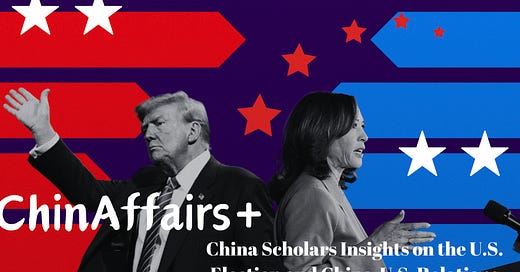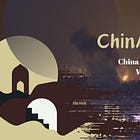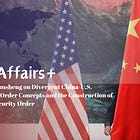#2 China Scholar Insights: 2024 U.S. Election's impact on China-U.S. Relations
The 2024 U.S. presidential election is thus more than a domestic affair; it is a global event that will set the stage for the next chapter in international relations.
Welcome to the second edition of China Scholar Insights!
China Scholar Insights is a newly launched feature by ChinAffairs+, which aimed at providing you with the latest analysis on issues that Chinese scholars and strategic communities are focusing on. We will carefully select commentary articles and highlight key points. Questions or criticisms can be directed to sunchenghao@tsinghua.edu.cn.
As of today, the U.S. presidential election appears to have concluded, with Trump declaring victory over Harris.This result carries significant implications for the United States, China, and the world. Before the final outcome was announced, many Chinese scholars analyzed the potential impact of each candidate on U.S.-China relations, highlighting the contrasting policies of the two parties. However, they also pointed out that, regardless of the election result, the overarching trend of U.S. strategic competition with China is unlikely to change. In this special edition of our newsletter, we have selected several insightful articles analyzing the U.S. election and its implications for U.S.-China relations. These pieces examine the potential fluctuations in bilateral relations from various perspectives. Given that the election results have been finalized, this newsletter serves as a special update. Following the dust settling, we will continue to bring you Chinese scholars’ analyses on the Trump administration’s approach and share their perspectives and outlook on the trajectory of U.S.-China relations under Trump’s presidency. Stay tuned for more.
ChinAffairs+ is a newsletter that shares Chinese academic articles focused on topics such as China’s foreign policy, China-U.S. relations, China-European relations, and more. This newsletter was co-founded by me and my research assistant, ZHANG Xueyu. I am SUN Chenghao, a fellow with the Center for International Security and Strategy (CISS) at Tsinghua University, and currently a visiting scholar at the Paul Tsai China Center of Yale Law School.
Chinese Scholars on U.S. Election’s impact on China-U.S. Relations
Background: The 2024 U.S. Presidential Election and Its Global Implications
As one of the world's most powerful nation, the United States is gearing up for the 2024 presidential election, an event that captures the attention of the international community. The 2024 election, which began with the "second showdown" between the two elderly statesmen Biden and Trump, went through many uncertainties and eventually evolved into a "generational showdown" between Harris and Trump. With the current geopolitical landscape marked by increasing tensions and shifting alliances, the election is seen as a pivotal moment that could redefine America's role in the world and its relationships with other nations, particularly its complex and critical ties with China. As the outcome approaches, the debate intensifies over the direction the U.S. should take, with the potential to either maintain the status quo or chart a new course that could influence international dynamics for years to come. The 2024 U.S. presidential election is thus more than a domestic affair; it is a global event that will set the stage for the next chapter in international relations.
Summary
Chinese scholars featured in this issue share a consensus that whether Trump or Harris takes the helm, the election is unlikely to herald a substantive shift in U.S. policy towards China. Suggesting the "strategic competition against China" will remain unchanged and it will not suddenly shift from fierce rivalry to intimate cooperation. Instead, only tactical adjustments are anticipated. In essence, the scholars suggest that while the election's immediate impact on the China-U.S. relations may be muted, the long-term trajectory of engagement, influenced by domestic politics and global strategies, is set to continue on its current path. This underscores the complexity of the U.S.-China dynamic, where the election's outcome is but one piece in a larger geopolitical puzzle.
Insights
DIAO Daming: The Implications of the 2024 US Election: Four Years or Forty?
The Nature of the 2024 Election: A Confrontation between two versions of the U.S.
The upcoming election is seen as a a fierce collision between two starkly different paths of American development and political advocacy or a "duel between two Americas." Therefore, the 2024 election could serve as a significant milestone in US political history. It may mark the end of one political cycle and the beginning of another. Trump's election in 2016 was seen by some as the end of a period of moderate liberalism that began in the 1990s. If he is re-elected, it could signal the continuation of a more conservative and populist trend.
Politicization of the Judiciary: Trump faced a number of criminal indictments during the election. Although these indictments did not have a decisive impact before the election, they still reflects the cautious attitude of the US judiciary in dealing with the cases of political figures, and highlights the problem of the politicisation of justice. It will trigger a series of political upheavals and exacerbate political division, and the way the Democratic Party responds to Trump reflects the irrationality of the political struggle between the two parties, plunging American politics into a state of unstable "madness".
Generational Change between the Two Parties: Democrats and Republicans show stark differences in generational change. The Democratic Party has achieved a degree of generational renewal from Biden to Harris, but it has been slower than the Republican Party. The Republican Party's choice of the young Vance as its vice presidential candidate has enabled a rapid generational change, which means more young politicians will join. There are differences in political ideas among politicians of different generations, which will affect the future development direction and policy formulation of the two parties, changing the political landscape and the competition between the two parties in the United States.
The Impact of the Election:Short-Term Stable Confrontation, Long-Term Change in U.S.-China Relations
The change in leadership within the Democratic Party has left Kamala Harris with insufficient time to articulate her policies and differentiate herself from the Biden administration. Harris recognizes that Trump is leading America in a different direction. Still, if eight years ago America's choice of Trump was blind, today's choice of Trump signifies that more people approve of the direction Trump represents for the country.
In the short term, the election of any party will not change the direction of the U.S. strategic competition with China. The difference will lie in the interaction methods and pace over the next four years. However, the 2024 U.S. presidential election reflects profound changes in U.S. domestic politics, which will significantly impact the U.S. political ecology and its international role, including its policy towards China. Therefore, while this election may not have a huge impact on U.S.-China relations in the next four years, it will influence the United States over the next decade or even forty years, thereby having long-term effects on U.S.-China relations and the global order.
Diao Daming is a professor at the School of International Studies, Renmin University of China. Deputy Director of the American Studies Center. Guest Expert at the Center for International Security and Strategy (CISS).His research focuses on American politics and foreign policy, as well as China-U.S. relations.This article was originally published on Chongyang Institute for Financial Studies, Renmin University of China (RDCY).
DA Wei: U.S.-China Relations—Moving Toward a New Normal or Greater Turbulence?
The Structural Confrontation between China and U.S. remain Unchanged
The strategic competition between the U.S. and China has become a persistent state, unaffected by short-term political changes. Based on personal experiences, Da believed that the certain degree of stabilization in U.S.-China relations appeared last year is largely superficial and the two sides remain sharply apart on many issues, especially in technology and economy. Therefore, the two countries will continue the intense competition across core areas such as technology, economic security, and military capabilities, with this rivalry anticipated to expand beyond traditional domains to influence the shaping of global rules and standards.
Increased Confrontation and Uncertainty in U.S.-China Relations if Trump Returns: Restart the Trade War, Strengthen the technological blockade, and Enhance Military Deterrence on Key Issues toward China
Trump is likely to restart the trade war with China, using tariffs and other economic measures to exert pressure. These policies would not only introduce greater uncertainty into U.S.-China trade relations but could also further disrupt global supply chains. In addition, Trump may revive the “China Initiative,” intensifying restrictions on China’s access to critical technologies to curb its advancements in the tech sector, especially in strategic fields such as chips and artificial intelligence, which would impose significant challenges for China’s future in technological innovation. In military domain, Trump’s team may allocate more resources to the Asia-Pacific region, adopting a more assertive stance on issues such as the South China Sea and Taiwan, aiming to counter China’s rise through military means. Although Trump may be reluctant to go to war, his policies could exacerbate tensions in the Taiwan Strait, particularly through increased arms sales and assistance that raise the risk of conflict.
Prospects for China-Us relations
The U.S.-China relationship is not only a great power rivalry but also a contest between two distinct development models. Its future trajectory will depend on how both countries respond to changes in their respective domestic and international environments. When addressing U.S.-China relations, Chinese scholars and politicians should adopt a long-term perspective and systematic thinking, avoiding short-term reactive measures and gradually forming a comprehensive perception of the strategic competition between the two states.
Da Wei is the director of the Center for International Security and Strategy (CISS) at Tsinghua, and professor of department of International Relations, school of Social Science, Tsinghua University. This article was originally published on Chongyang Institute for Financial Studies, Renmin University of China (RDCY).
JIA Qingguo: Regardless of who is elected, people-to-people exchange between China and the U.S. will face difficulties and challenges
Major obstacles to current people-to-people exchange between China and the U.S.: Strained Bilateral Relations, U.S. Public Concerns Regarding China, and technical obstacles
The poor relations between the two countries, including the economic and trade relations have been greatly affected, which directly dimmed the prospects of American students to study, internship and employment in China. Meanwhile, certain COVID-19 prevention measures in China have been maliciously exaggerated by some media, leading many Americans to perceive China as unsafe for travel. Additionally, the implementation of the National Security Law and Anti-Espionage Law has heightened concerns among some foreign visitors regarding safety in China.
Further, China needs to provide more convenient services for foreign visitors, such as payment systems, and improve the English services of its e-commerce platforms. In addition, the reduced number of flights between China and the U.S. post-pandemic has led to higher travel costs, further hindering people-to-people exchanges.
Impacts of the 2024 Election on people-to-people exchange: If Donald Trump wins the election, people-to-people exchange is likely to suffer a severe blow.
During Trump's previous administration, concerns arose regarding the perception of China-U.S. people-to-people exchange as a "security risk". The U.S. State Department has even issued travel warnings for China. If Trump is re-elected, his tendency to overly emphasize security ricks and view the Chinese government as a threat to U.S. safety could lead to the excessive politicization and securitization of people-to-people exchange.
What China should do when people-to-people exchanges are blocked:
People-to-people exchange is crucial for eliminating misunderstandings, increasing mutual trust and strengthening cooperation, which are directly related to the future of China-U.S. relations. However, considering the fact that the general trend of US competition with China will not change in a short term, the revival of people-to-people exchanges may take years. Under this circumstance, China should actively promote people-to-people between two countries, especially among teenage students from both sides.
JIA Qingguo is the professor of the School of International Studies at Peking University. Original article was written by Lu Cen, China-US Focus.
Zhou Wenxing:"Weaponization faction" emerges as a significant force influencing U.S. government policy towards China.
What is the 'Weaponization Faction'? The 'Weaponization Faction' refers to a group within the U.S. strategic community, who advocates leveraging America's superior resources and interdependent relationships to curb China's development. They propose using policies such as imposing high tariffs and initiating China-U.S. trade negotiations to "weaponize" the U.S.'s significant advantages in interdependent relationships. In summary, they aim to preserve the interdependence among countries, but with the US playing a dominant role and continuously expanding its strategic advantages.
The 'Weaponization Faction' represents a bipartisan consensus on China policy in the U.S.: The intense debate between the 'Decoupling Faction' and the 'Engagement Faction' has given rise to the 'Weaponization Faction,' which blends some policy proposals from both sides. The 'Engagement Faction' hopes to deepen the interdependence between China and the U.S. and maintain engagement across various fields, while the 'Decoupling Faction' views the US as a victim of global interdependence and advocates severing ties with China in various areas. However, forced decoupling has proven to be detrimental to the global interests of the U.S., while the 'Engagement Faction' has been marginalized against the backdrop of competition between China and the U.S.. In this context, the 'Weapinization Faction', which is more moderate, has risen rapidly, becoming the consensus between the Republican Party and the Democratic Party.
The new US government will continue to adopt the policy advocacy of the 'Weaponization Faction': The Biden administration primarily adopts a China policy that prioritizes the 'Weaponization' faction" with the 'Engagement Faction' serving as a supplement. This approach is similar to the Trump administration's policy, which also prioritized the 'Weaponization Faction' with the 'Decoupling Faction' as a supplement. After the next general election, if Trump were to win again, he is likely to continue the China policy from his previous term, with the 'Weaponization Faction' potentially playing an even more crucial role.
Zhou Wenxing is an associate professor (with tenure-track status) and researcher at Nanjing University. He has visited multiple institutions and universities, and his main research areas focus on issues relating to Taiwan and China-U.S. relations.The original article was published on China-US Focus.
Ni Feng: Two Americas are in a fierce battle
The Gradual Divergence of “Two Americas”: This year’s U.S. election can be observed from multiple perspectives. From a polarized viewpoint, the Republican Party represented by Trump, and the Democratic Party represented by Biden and Harris symbolize “Two Americas.” The America represented by Biden and Harris exists within the global system, an imperial America. In contrast, the American represented by Trump is a nation-state dominated by whites and Christianity, emphasizing “America First”. Historically, the two Americas were nearly unified after WWII. However, following the Cold War and Globalization, domestic interests in the U.S. began to diverge. Today, the United States is in a state of deep division, with these two Amercias becoming increasingly distinct.
The Role of U.S.-China Relations in the U.S. Election: In June, President Biden imposed a 100% tariff on Chinese electric vehicles. This decision is tied to the importance of Michigan state, a key “swing state” in this year’s election. Michigan is the hub of the U.S. automobile industry and home to large numbers of auto industry workers, winning the voters in the swing state is crucial for winning the election, thus this move is linked to U.S.-China Relations.
Regardless of whether the winner is Trump or Harris, the fundamental direction of U.S. policy toward China--strategic competition--remains consistent. However, the methods and approaches will certainly differ significantly. Trump’s team, the economic and trade team, is known for advocating a decisive decoupling from China. If Trump returns, he may start with economics and trade first, as this team is well-established and aligns with his views.
Ni Feng is the director of the Institute of American Studies, President of the Institute of American Studies (CASS), and President of the Chinese Association of American Studies. His research field mainly focuses on U.S. foreign policy and East Asian security affairs. The original article published on Chongyang Institute for Financial Studies, Renmin University of China (RDCY).
Conclusion
Even to this day, there is a lingering sense of uncertainty in 2024 U.S. Election, as if the dust has yet to settle. Should Trump win the popular vote, his situation remains challenging, facing significant pressure from various quarters. Questions from states, the influence of Harris, and partisan strife—this series of bewildering moves undoubtedly causes him many handicaps. Additionally, the authority and legitimacy of the presidency will be hotly contested, plunging the nation's constitutional governance into crisis. This confirms Gore's remark, "Even if I lose, you can't win."The scholars' consensus on the limited potential for substantive policy changes in U.S.-China relations, coupled with the anticipation of strategic adjustments, reminding us that despite the unknown election outcome, the fundamental dynamics and strategic competition between the two nations will continue. These insights are not just relevant for the next four years but could shape the trajectory of U.S.-China relations for decades to come.
Writers and Editors for Today’s Newsletter:
Writers:
HU Lingzhi, BAI Xuhan, GAO Liangyu, WANG Jiaying and HNIN Lei Lei Wai, Tsinghua University
Editors:
SUN Chenghao, Fellow, Center for International Security and Strategy, Tsinghua University, and Visiting Scholar at Paul Tsai China Center of Yale Law School
ZHANG Xueyu, Youth Fellow, U.S.-Europe Program, Center for International Security and Strategy, Tsinghua University










